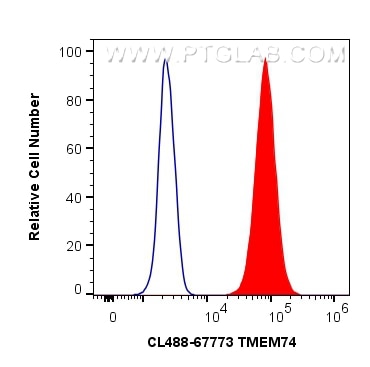Anticorps Monoclonal anti-TMEM74
TMEM74 Monoclonal Antibody for FC (Intra)
Hôte / Isotype
Mouse / IgG1
Réactivité testée
Humain
Applications
FC (Intra)
Conjugaison
CoraLite® Plus 488 Fluorescent Dye
CloneNo.
2H1B7
N° de cat : CL488-67773
Synonymes
Galerie de données de validation
Applications testées
| Résultats positifs en cytométrie | cellules HEK-293 |
Dilution recommandée
| Application | Dilution |
|---|---|
| Flow Cytometry (FC) | FC : 0.40 ug per 10^6 cells in a 100 µl suspension |
| It is recommended that this reagent should be titrated in each testing system to obtain optimal results. | |
| Sample-dependent, check data in validation data gallery | |
Informations sur le produit
CL488-67773 cible TMEM74 dans les applications de FC (Intra) et montre une réactivité avec des échantillons Humain
| Réactivité | Humain |
| Hôte / Isotype | Mouse / IgG1 |
| Clonalité | Monoclonal |
| Type | Anticorps |
| Immunogène | TMEM74 Protéine recombinante Ag22359 |
| Nom complet | transmembrane protein 74 |
| Masse moléculaire calculée | 305 aa, 33 kDa |
| Poids moléculaire observé | 33 kDa |
| Numéro d’acquisition GenBank | BC030710 |
| Symbole du gène | TMEM74 |
| Identification du gène (NCBI) | 157753 |
| Conjugaison | CoraLite® Plus 488 Fluorescent Dye |
| Excitation/Emission maxima wavelengths | 493 nm / 522 nm |
| Forme | Liquide |
| Méthode de purification | Purification par protéine G |
| Tampon de stockage | PBS avec glycérol à 50 %, Proclin300 à 0,05 % et BSA à 0,5 %, pH 7,3. |
| Conditions de stockage | Stocker à -20 °C. Éviter toute exposition à la lumière. Stable pendant un an après l'expédition. L'aliquotage n'est pas nécessaire pour le stockage à -20oC Les 20ul contiennent 0,1% de BSA. |
Informations générales
Transmembrane protein 74 (TMEM74), plays an essential role in autophagy during cell starvation and other stress conditions. TMEM74 is localized to the lysosome and autophagosome. It has been rreported that TMEM74-induced autophagy may be associated with PI3K signal transduction. (PMID: 19029833, 18294959)
Protocole
| Product Specific Protocols | |
|---|---|
| FC protocol for CL Plus 488 TMEM74 antibody CL488-67773 | Download protocol |
| Standard Protocols | |
|---|---|
| Click here to view our Standard Protocols |


